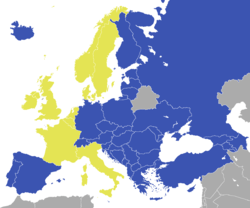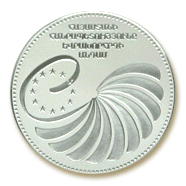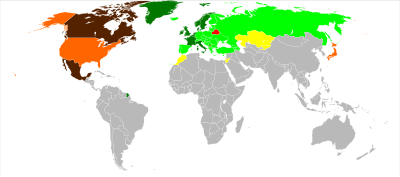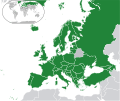Member states of the Council of Europe
The Council of Europe was founded on 5 May 1949 by ten western and northern European states,[1] with Greece[2][3] joining three months later, and Iceland,[4][5] Turkey[6][7] and West Germany[8][9] joining the next year. It now has 47 member states, with Montenegro being the latest to join.

Article 4 of the Council of Europe Statute specifies that membership is open to any European country, provided they meet specific democratic and human rights standards.[10] Nearly all European countries have acceded to the Council of Europe, with the exception of Belarus and the Vatican City, as well as some of the states with limited recognition.
List
| Flag | Arms | State[11] | Capital | Date joined | Notes |
|---|---|---|---|---|---|
| Netherlands | Amsterdam | 5 May 1949 | Founder | ||
| Belgium | Brussels | 5 May 1949 | Founder | ||
| Luxembourg | Luxembourg City | 5 May 1949 | Founder | ||
| Denmark | Copenhagen | 5 May 1949 | Founder | ||
| France | Paris | 5 May 1949 | Founder | ||
| Norway | Oslo | 5 May 1949 | Founder | ||
| Sweden | Stockholm | 5 May 1949 | Founder | ||
| United Kingdom | London | 5 May 1949 | Founder | ||
| Ireland | Dublin | 5 May 1949 | Founder | ||
| Italy | Rome | 5 May 1949 | Founder | ||
| Greece | Athens | 9 August 1949[2][3] | Withdrew from Council membership during the Greek military junta of 1967–1974. | ||
| Iceland | Reykjavik | 7 March 1950[4][5] | |||
| Turkey | Ankara | 13 April 1950[6][7] | |||
| Germany | Berlin | 13 July 1950[8][9] | The Federal Republic of Germany (West Germany) and the Saar Protectorate became associate members in 1950. The Federal Republic became a full member in 1951. The Saar acceded to the Federal Republic in 1956, and the states of the former East Germany became part of the Federal Republic upon reunification in 1990. East Germany had never been a member of the Council. | ||
| Austria | Vienna | 16 April 1956 | |||
| Cyprus | Nicosia | 24 May 1961 | |||
| Switzerland | Bern | 6 May 1963 | |||
| Malta | Valletta | 29 April 1965 | |||
| Portugal | Lisbon | 22 September 1976 | |||
| Spain | Madrid | 24 November 1977 | |||
| Liechtenstein | Vaduz | 23 November 1978 | |||
| San Marino | City of San Marino | 16 November 1988 | |||
| Finland | Helsinki | 5 May 1989 | |||
| Hungary | Budapest | 6 November 1990 | |||
| Poland | Warsaw | 26 November 1991 | |||
| Bulgaria | Sofia | 7 May 1992 | |||
| Estonia | Tallinn | 14 May 1993 | |||
| Lithuania | Vilnius | 14 May 1993 | |||
| Slovenia | Ljubljana | 14 May 1993 | |||
| Czech Republic | Prague | 30 June 1993 | Previously a member of the Council as part of Czechoslovakia from 21 January 1991 to the latter's dissolution on 31 December 1992. | ||
| Slovakia | Bratislava | 30 June 1993 | Previously a member of the Council as part of Czechoslovakia from 21 January 1991 to the latter's dissolution on 31 December 1992. | ||
| Romania | Bucharest | 7 October 1993 | |||
| Andorra | Andorra la Vella | 10 November 1994 | |||
| Latvia | Riga | 10 February 1995 | |||
| Moldova | Chisinau | 13 July 1995 | |||
| Albania | Tirana | 13 July 1995 | |||
| Ukraine | Kiev | 9 November 1995 | |||
| North Macedonia | Skopje | 9 November 1995 | Until 12 February 2019 called Republic of Macedonia, officially referred to as "the former Yugoslav Republic of Macedonia" due to a naming dispute. | ||
| Russia | Moscow | 28 February 1996 | |||
| Croatia | Zagreb | 6 November 1996 | |||
| Georgia | Tbilisi | 27 April 1999 | |||
| Armenia | Yerevan | 25 January 2001 | |||
| Azerbaijan | Baku | 25 January 2001 | |||
| Bosnia and Herzegovina | Sarajevo | 24 April 2002 | |||
| Serbia | Belgrade | 3 April 2003 | Originally joined as Serbia and Montenegro. After Montenegrin independence in 2006, the Committee of Ministers declared that the Republic of Serbia would continue the membership of the former State Union of Serbia and Montenegro.[12] | ||
| Monaco | Monaco City | 5 October 2004 | |||
| Montenegro | Podgorica | 11 May 2007 | Previously a member of the Council as part of Serbia and Montenegro from 2003. |

Applicants
Special Guest status with the Parliamentary Assembly was established in 1989, as a provisional status in the accession process for parliaments of European non-member states, which applied for membership in the Council of Europe. The aim of the special guest status is to foster closer relations with the national parliaments of the European non-member states, by enabling the parliament concerned to be represented in, and work with, the Assembly, especially in determining the accession conditions.[13]
Belarus applied for full membership on 12 March 1993, and its parliament held special guest status with the Parliamentary Assembly from September 1992 to January 1997. The special guest status was however suspended as a consequence of the November 1996 constitutional referendum introducing death penalty, and parliament by-elections which the CoE found to be undemocratic, as well as enforced limits on democratic freedoms such as freedom of expression (cf. Belarusian media) under the administration of President Alexander Lukashenko. A second change of the Belarus constitution in October 2004, moreover "does not respect minimum democratic standards and violates the principles of separation of powers and the rule of law".[14] In June 2009, PACE decided that the suspension of the Belarusian parliament's special guest status in the Assembly would only be lifted conditional of the government imposing a moratorium on the death penalty. As of May 2013, this condition had not been met.[15]
Kazakhstan applied for the Special Guest status with the Parliamentary Assembly in 1999. The Assembly found that Kazakhstan could apply for full membership, because 4% of its territory, west of the Ural river, is located in Europe,[16] but granting Special Guest status would require improvements in the fields of democracy and human rights. Kazakhstan signed a co-operation agreement with the Assembly in April 2004. In November 2006, the Kazakhstan Parliament officially asked to be granted observer status with the Assembly, which however never was granted due to requiring a pre compliance with all CoE core values and principles.[13] The country acceded to the Council of Europe European Cultural Convention on 24 February 2010.[17] On 15 to 16 March 2010, the President of the Council of Europe's Parliamentary Assembly (PACE) made an official visit to Kazakhstan,[18] resulting in the conclusion that the Council of Europe and Kazakhstan strengthen their relations. This milestone emboldens Kazakhstan's "Path to Europe" programme, as outlined by Kazakh president Nursultan Nazarbayev in Astana in 2008.[19] In December 2013, a Joint Declaration on enhancing cooperation between Kazakhstan and the Council of Europe in 2014–15, was signed with the purpose of paving the way for Kazakhstan's accession to the Council of Europe's multiple conventions in the field of criminal justice.[20][21]
Hashim Thaçi, Kosovo's Minister of Foreign Affairs, stated in December 2014 that an application for membership of the Council of Europe was planned to be filed within the first quarter of 2015.[22]
Observers

Observer status was designed for non-European democracies willing to contribute to democratic transitions in Europe.[13]
Canada, Japan, Mexico, the U.S. and the Holy See have observer status with the Council of Europe and can participate in the Committee of Ministers and all intergovernmental committees. They may contribute financially to the activities of the Council of Europe on a voluntary basis.
The parliaments of Canada, Israel and Mexico have observer status with the Parliamentary Assembly and their delegations can participate in Assembly sessions and committee meetings. Representatives of the Palestinian Legislative Council may participate in Assembly debates concerning the Middle East as well as Turkish-Cypriot representatives from Northern Cyprus concerning this island.
There has been criticism concerning the observer status of Japan and the United States because both countries apply the death penalty.[23] The Parliamentary Assembly of the Council of Europe has been lobbying for the United States and Japan to abolish the death penalty or lose their observer status. The Council also voted to restore Special Guest status to Belarus, on condition that Belarus declares a moratorium on the death penalty.
Partners
In May 2009, the Parliamentary Assembly established a new status for institutional co-operation with parliaments of non-member states in neighboring regions wishing to be supported by the Parliamentary Assembly in their democratic transitions and to participate in the political debate on common challenges.[13]
The new status is called "Partner for democracy" and interested states could obtain it if they commit to embrace the values of the Council of Europe such as pluralist democracy, the rule of law and respect for human rights and fundamental freedoms; to encourage a moratorium on executions and abolish the death penalty; to organize free and fair elections; to become party to the relevant CoE conventions; to utilize the expertize of the Assembly and the Venice Commission in its institutional and legislative work.[13]
CoE has adopted the policy of dialogue with the neighboring regions of the southern Mediterranean, the Middle East and Central Asia – based on respect for universal human rights. Following this policy the Assembly has already established working contacts with parliaments of neighbouring countries other than those of the CoE Observers: Algeria, Kazakhstan, Morocco, Tunisia and the Palestinian Legislative Council. Several of these parliaments have expressed interest in upgrading the status of the existing co-operation, and in establishing a relationship on a permanent basis. Since 1994 the parliaments of the countries bordering the Council of Europe member states have the possibility of concluding special co-operation agreements with the Assembly, but it has not generated much interest among the parliaments concerned, which suggests that it does not offer sufficient clarity and visibility. So far only the Kazakhstan Parliament had taken advantage of it since 2004. In November 2006, the Kazakhstan Parliament officially asked to be granted observer status with the Assembly. Such formal or informal requests are made by a number of parliaments that are already co-operating with it but think that the institutionalized recognition of that co-operation could make it more visible, more coherent and more effective. However the observer status is considered inappropriate in these cases, as it requires that the state receiving it already complies with the CoE core values and principles, which is not the case for the states currently requesting it, who are in the early stages of democratic transition.[13]
The newly established "Partner for democracy" status is similar to the co-operation initiatives of other intergovernmental organizations of mostly European states such as the European Neighbourhood Policy of the EU, the partners for co-operation of OSCE, the cooperation with non-member states of NATO.
The national parliaments eligible to request a "Partner for democracy" status are from the following countries:[13]
- southern Mediterranean and Middle East participants in the Union for the Mediterranean: Mauritania, Morocco, Algeria, Tunisia, Egypt, Jordan, Syria, Lebanon, Palestine and maybe Libya[24]
- Central Asian participants in the OSCE: Kazakhstan, Kyrgyzstan, Tajikistan, Turkmenistan and Uzbekistan
- other states if the Bureau of the Assembly so decides
As of 2015 the following parliaments have been accorded "Partner for democracy" status:[25][26]
- Morocco – June 2011[27]
- Palestinian National Council – 4 October 2011[28]
- Kyrgyzstan – 8 April 2014[29]
References
- "Statute of the Council of Europe is signed in London". Council of Europe. Retrieved 23 June 2019.
On 5 May 1949, at St James’s Palace, London, the Foreign Ministers of Belgium, Denmark, France, Ireland, Italy, Luxembourg, the Netherlands, Norway, Sweden and the United Kingdom signed the Treaty establishing the Council of Europe.
- "Greece joins". Council of Europe. Retrieved 23 June 2019.
- "Greece - Member state". Council of Europe. Retrieved 23 June 2019.
Greece became the 11th member State of the Council of Europe on 9 August 1949.
- "Iceland joins". Council of Europe. Retrieved 23 June 2019.
- "Iceland - Member state". Council of Europe. Retrieved 23 June 2019.
Iceland became the 12th member State of the Council of Europe on 7 March 1950.
- "Turkey joins". Council of Europe. Retrieved 23 June 2019.
- "Turkey - Member state". Council of Europe. Retrieved 23 June 2019.
Turkey became the 13th member State of the Council of Europe on 13 April 1950.
- "Federal Republic of Germany joins the Council of Europe". Council of Europe. Retrieved 23 June 2019.
- "Germany - Member state". Council of Europe. Retrieved 23 June 2019.
Germany became the 14th member State of the Council of Europe on 13 July 1950.
- "Full list". Council of Europe. Retrieved 23 June 2019.
- "Member states". Council of Europe. Retrieved 22 December 2013.
- "Continuation by the Republic of Serbia of membership of the State Union of Serbia and Montenegro in the Council of Europe". Council of Europe. 14 June 2006. Retrieved 5 August 2008.
- "Establishment of a "Partner for democracy" status with the Parliamentary Assembly". Parliamentary Assembly Council of Europe. 14 May 2009.
- "Belarus: a referendum under a 'hardening dictatorial regime'". Council of Europe. 2004. Retrieved 5 August 2008.
- "Secretary general hopes that Belarus will join Council of Europe". Freeales.fidh.net. 22 May 2013. Archived from the original on 10 November 2013.
- "Situation in Kazakhstan and its Relations with the Council of Europe". Document 11007: II General information, point 11. Parliamentary Assembly Council of Europe. 7 July 2006.
- Council of Europe - Committee of Ministers - 1074 Meeting, 13 January 2010 – 7.4 European Cultural Convention (ETS No. 18)
- "PACE President in favour of strengthening relations with Kazakhstan". Assembly.coe.int. Retrieved 28 September 2019.
- "Archived copy". Archived from the original on 26 August 2010. Retrieved 25 July 2010.CS1 maint: archived copy as title (link)
- "Neighbourhood Co-operation Priorities for Kazakhstan 2014–2015: Co-operation activities on Council of Europe's conventions in criminal matters". Council of Europe. 9 December 2013.
- "Joint Declaration on enhancing cooperation between Kazakhstan and the Council of Europe signed in Brussels". Kazinform. 20 December 2013.
- Kosovo applies to become EC member within three months
- "Europarådet kan frånta USA observatörsstatus". Yelah. 2004. Retrieved 22 February 2008.
- Libya is observer of the Union for the Mediterranean.
- "Council of Europe body gives Palestinians 'partner' status". The Daily Star. 5 October 2011. Retrieved 28 September 2019.
- "Middle East News". The Jerusalem Post. Retrieved 28 September 2019.
- PACE grants 'Partner for democracy' status to the Palestinian National Council, Strasbourg, 04.10.2011: "In June this year, the Parliament of Morocco became the first to be granted the new status"
- 2011 ORDINARY SESSION, Thirtieth sitting, Tuesday 4 October 2011 Archived 7 March 2014 at the Wayback Machine
- PACE discusses situation in Ukraine, reconsiders Russian credentials
